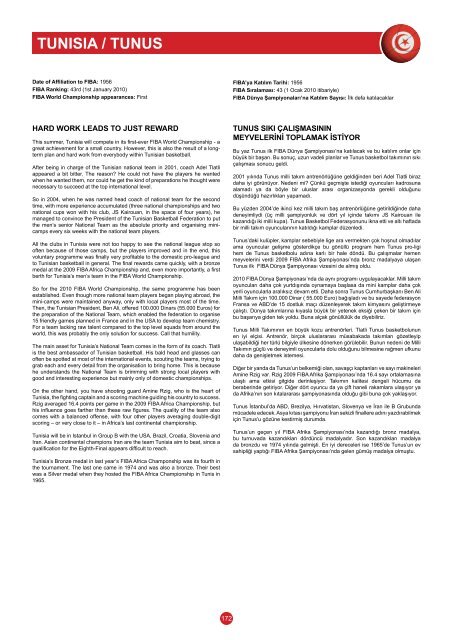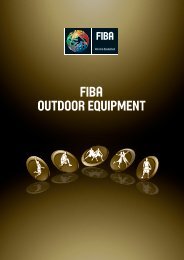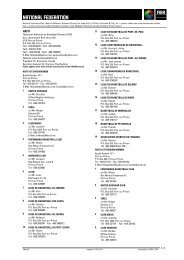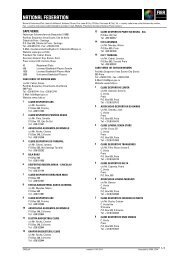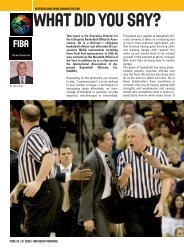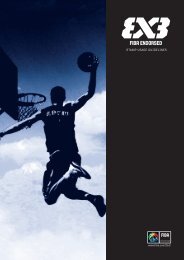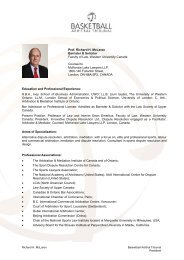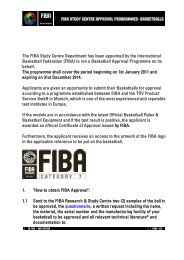brazıl / brezilya - FIBA.com
brazıl / brezilya - FIBA.com
brazıl / brezilya - FIBA.com
Create successful ePaper yourself
Turn your PDF publications into a flip-book with our unique Google optimized e-Paper software.
TUNISIA / TUNUS<br />
Date of Affiliation to <strong>FIBA</strong>: 1956<br />
<strong>FIBA</strong> Ranking: 43rd (1st January 2010)<br />
<strong>FIBA</strong> World Championship appearances: First<br />
HARD WORK LEADS TO JUST REWARD<br />
This summer, Tunisia will <strong>com</strong>pete in its first-ever <strong>FIBA</strong> World Championship - a<br />
great achievement for a small country. However, this is also the result of a longterm<br />
plan and hard work from everybody within Tunisian basketball.<br />
After being in charge of the Tunisian national team in 2001, coach Adel Tlatli<br />
appeared a bit bitter. The reason? He could not have the players he wanted<br />
when he wanted them, nor could he get the kind of preparations he thought were<br />
necessary to succeed at the top international level.<br />
So in 2004, when he was named head coach of national team for the second<br />
time, with more experience accumulated (three national championships and two<br />
national cups won with his club, JS Kairouan, in the space of four years), he<br />
managed to convince the President of the Tunisian Basketball Federation to put<br />
the men’s senior National Team as the absolute priority and organising minicamps<br />
every six weeks with the national team players.<br />
All the clubs in Tunisia were not too happy to see the national league stop so<br />
often because of those camps, but the players improved and in the end, this<br />
voluntary programme was finally very profitable to the domestic pro-league and<br />
to Tunisian basketball in general. The final rewards came quickly, with a bronze<br />
medal at the 2009 <strong>FIBA</strong> Africa Championship and, even more importantly, a first<br />
berth for Tunisia’s men’s team in the <strong>FIBA</strong> World Championship.<br />
So for the 2010 <strong>FIBA</strong> World Championship, the same programme has been<br />
established. Even though more national team players began playing abroad, the<br />
mini-camps were maintained anyway, only with local players most of the time.<br />
Then, the Tunisian President, Ben Ali, offered 100.000 Dinars (55.000 Euros) for<br />
the preparation of the National Team, which enabled the federation to organise<br />
15 friendly games planned in France and in the USA to develop team chemistry.<br />
For a team lacking raw talent <strong>com</strong>pared to the top level squads from around the<br />
world, this was probably the only solution for success. Call that humility.<br />
The main asset for Tunisia’s National Team <strong>com</strong>es in the form of its coach. Tlatli<br />
is the best ambassador of Tunisian basketball. His bald head and glasses can<br />
often be spotted at most of the international events, scouting the teams, trying to<br />
grab each and every detail from the organisation to bring home. This is because<br />
he understands the National Team is brimming with strong local players with<br />
good and interesting experience but mainly only of domestic championships.<br />
On the other hand, you have shooting guard Amine Rzig, who is the heart of<br />
Tunisia, the fighting captain and a scoring machine guiding his country to success.<br />
Rzig averaged 16.4 points per game in the 2009 <strong>FIBA</strong> Africa Championship, but<br />
his influence goes farther than these raw figures. The quality of the team also<br />
<strong>com</strong>es with a balanced offense, with four other players averaging double-digit<br />
scoring – or very close to it – in Africa’s last continental championship.<br />
Tunisia will be in Istanbul in Group B with the USA, Brazil, Croatia, Slovenia and<br />
Iran. Asian continental champions Iran are the team Tunisia aim to beat, since a<br />
qualification for the Eighth-Final appears difficult to reach.<br />
Tunisia’s Bronze medal in last year’s <strong>FIBA</strong> Africa Champonship was its fourth in<br />
the tournament. The last one came in 1974 and was also a bronze. Their best<br />
was a Silver medal when they hosted the <strong>FIBA</strong> Africa Championship in Tunis in<br />
1965.<br />
172<br />
<strong>FIBA</strong>’ya Katılım Tarihi: 1956<br />
<strong>FIBA</strong> Sıralaması: 43 (1 Ocak 2010 itibariyle)<br />
<strong>FIBA</strong> Dünya Şampiyonaları’na Katılım Sayısı: İlk defa katılacaklar<br />
TUNUS SIKI ÇALIŞMASININ<br />
MEYVELERİNİ TOPLAMAK İSTİYOR<br />
Bu yaz Tunus ilk <strong>FIBA</strong> Dünya Şampiyonası’na katılacak ve bu katılım onlar için<br />
büyük bir başarı. Bu sonuç, uzun vadeli planlar ve Tunus basketbol takımının sıkı<br />
çalışması sonucu geldi.<br />
2001 yılında Tunus milli takım antrenörlüğüne geldiğinden beri Adel Tlatli biraz<br />
daha iyi görünüyor. Nedeni mi? Çünkü geçmişte istediği oyuncuları kadrosuna<br />
alamadı ya da böyle bir uluslar arası organizasyonda gerekli olduğunu<br />
düşündüğü hazırlıkları yapamadı.<br />
Bu yüzden 2004’de ikinci kez milli takım baş antrenörlüğüne getirildiğinde daha<br />
deneyimliydi (üç milli şampiyonluk ve dört yıl içinde takımı JS Kairouan ile<br />
kazandığı iki milli kupa). Tunus Basketbol Federasyonunu ikna etti ve altı haftada<br />
bir milli takım oyuncularının katıldığı kamplar düzenledi.<br />
Tunus’daki kulüpler, kamplar sebebiyle lige ara vermekten çok hoşnut olmadılar<br />
ama oyuncular gelişme gösterdikçe bu gönüllü program hem Tunus pro-ligi<br />
hem de Tunus basketbolu adına karlı bir hale döndü. Bu çalışmalar hemen<br />
meyvelerini verdi 2009 <strong>FIBA</strong> Afrika Şampiyonası’nda bronz madalyaya ulaşan<br />
Tunus ilk <strong>FIBA</strong> Dünya Şampiyonası vizesini de almış oldu.<br />
2010 <strong>FIBA</strong> Dünya Şampiyonası’nda da aynı programı uygulayacaklar. Milli takım<br />
oyuncuları daha çok yurtdışında oynamaya başlasa da mini kamplar daha çok<br />
yerli oyuncularla aralıksız devam etti. Daha sonra Tunus Cumhurbaşkanı Ben Ali<br />
Milli Takım için 100.000 Dinar ( 55.000 Euro) bağışladı ve bu sayede federasyon<br />
Fransa ve ABD’de 15 dostluk maçı düzenleyerek takım kimyasını geliştirmeye<br />
çalıştı. Dünya takımlarına kıyasla büyük bir yetenek eksiği çeken bir takım için<br />
bu başarıya giden tek yoldu. Buna alçak gönüllülük de diyebiliriz.<br />
Tunus Milli Takımının en büyük kozu antrenörleri. Tlatli Tunus basketbolunun<br />
en iyi elçisi. Antrenör, birçok uluslararası müsabakada takımları gözetleyip<br />
ulaşabildiği her türlü bilgiyle ülkesine dönerken görülebilir. Bunun nedeni de Milli<br />
Takımın güçlü ve deneyimli oyuncularla dolu olduğunu bilmesine rağmen ufkunu<br />
daha da genişletmek istemesi.<br />
Diğer bir yanda da Tunus’un belkemiği olan, savaşçı kaptanları ve sayı makineleri<br />
Amine Rzig var. Rzig 2009 <strong>FIBA</strong> Afrika Şampiyonası’nda 16.4 sayı ortalamasına<br />
ulaştı ama etkisi gitgide derinleşiyor. Takımın kalitesi dengeli hücumu da<br />
beraberinde getiriyor. Diğer dört oyuncu da ya çift haneli rakamlara ulaşıyor ya<br />
da Afrika’nın son kıtalararası şampiyonasında olduğu gibi buna çok yaklaşıyor.<br />
Tunus İstanbul’da ABD, Brezilya, Hırvatistan, Slovenya ve İran ile B Grubunda<br />
mücadele edecek. Asya kıtası şampiyonu İran sekizli finallere adını yazdırabilmek<br />
için Tunus’u gözüne kestirmiş durumda.<br />
Tunus’un geçen yıl <strong>FIBA</strong> Afrika Şampiyonası’nda kazandığı bronz madalya,<br />
bu turnuvada kazandıkları dördüncü madalyadır. Son kazandıkları madalya<br />
da bronzdu ve 1974 yılında gelmişti. En iyi dereceleri ise 1965’de Tunus’un ev<br />
sahipliği yaptığı <strong>FIBA</strong> Afrika Şampiyonası’nda gelen gümüş madalya olmuştu.


